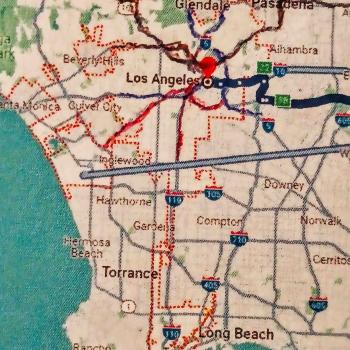Sometimes we read Scripture and wonder, “How did that happen?” A closer look usually reveals the answer. In today’s passage, deeper investigation shows that a confusing defeat actually made perfect sense!
Scripture:
2 Kings, chapters 13-14; 2 Chronicles, chapter 25; New Testament reading: 2 Timothy, chapter 3
2 Kings 14:8-14 (NLT):
One day Amaziah sent messengers with this challenge to Israel’s king Jehoash, the son of Jehoahaz and grandson of Jehu: “Come and meet me in battle!”
But King Jehoash of Israel replied to King Amaziah of Judah with this story: “Out in the Lebanon mountains and thistle sent a message to a mighty cedar tree: ‘Give your daughter in marriage to my son.’ But just then a wild animal of Lebanon came by and stepped on the thistle, crushing it! You have indeed defeated Edom, and you are proud of it. But be content with your victory and stay at home! Why stir up trouble that will only bring disaster on you and the people of Judah?”
But Amaziah refused to listen, so King Jehoash of Israel mobilized his army against King Amaziah of Judah. The two armies drew up their battle lines at Beth-shemesh in Judah. Judah was routed by the army of Israel, and its army scattered and fled for home. King Jehoash of Israel captured Judah’s king, Amaziah son of Joash and grandson of Ahaziah, at Beth-shemesh. Then he marched to Jerusalem, where he demolished 600 feet of Jerusalem’s wall, from the Ephraim Gate to the Corner Gate. He carried off all the gold and silver and all the articles from the Temple of the Lord. He also seized the treasures from the royal palace, along with hostages, and then returned to Samaria.
Observations:
How Did That Happen?
As we read this passage in 2 Kings 14, we need to remember a few things. First, Israel – the northern kingdom, also called Samaria – was bad. 2 Kings 13:10-11 tells us, “Jehoash son of Jehoahaz began to rule over Israel in the thirty-seventh year of King Joash’s reign in Judah. He reigned in Samaria sixteen years. But he did what was evil in the Lord’s sight. He refused to turn from the sins that Jeroboam son of Nebat had led Israel to commit.” So Jehoash and the people of Israel continued in the sins of idolatry and rebellion against God.
Second, we need to remember that Amaziah is generally depicted as a “good” king. “Amaziah did what was pleasing in the Lord’s sight, but not like his ancestor David. Instead, he followed the example of his father, Joash” (2 Kings 14:3). So Israel was bad, and Jehoahaz was bad; Judah was generally good, and Amaziah was good.
So how did Judah and Amaziah lose in battle to Jehoahaz and Israel? How did that happen?
The Rest of the Story
Years ago, Paul Harvey had a radio program called “The Rest of the Story.” He would tell about some historical event or person, and then at the end he would have a twist. He would end with the phrase, “And now you know the rest of the story.”
We find “the rest of the story” of Amaziah and Jehoahaz in our reading from 2 Chronicles 25 today. When Amaziah was preparing to go to battle against Edom, he hired troops from Israel. “But a man of God came to him and said, ‘Your majesty, do not hire troops from Israel, for the Lord is not with Israel. He will not help those people of Ephraim!” (2 Chronicles 25:7). So Amaziah sent the Israelite troops home and went to battle with his own troops. God gave Amaziah the victory.
“When King Amaziah returned from slaughtering the Edomites, he brought with him idols taken from the people of Seir. He set them up as his own gods, bowed down in front of them, and offered sacrifices to them!” (2 Chronicles 25:14). God was not pleased! “This made the Lord very angry, and he sent a prophet to ask, ‘Why do you turn to gods who could not even save their own people from you?’” (25:15). But Amaziah rejected the message from God.
How Did This Happen?
When Amaziah rejected his message, the prophet whom God had sent said this: “I know that God has determined to destroy you because you have done this and have refused to accept my counsel” (25:16). After that, Jehoahaz decided – in consultation with his advisers, rather than with God – to go out and fight with Israel. When Jehoahaz warned him, Amaziah refused to listen. “But Amaziah refused to listen, for God was determined to destroy him for turning to the gods of Edom” (25:20). And that’s exactly what happened.
Application:
How Did That Happen?
This story reminds us, again, of the importance of context in reading and understanding Scripture. If we only read the story in 2 Kings 14, we might wonder why God had allowed Amaziah, a “pretty good” king, to be so thoroughly defeated by Jehoahaz, a wicked king. How did that happen? But when we read “the rest of the story,” we understand. Amaziah had been a pretty good king, but he succumbed to the temptation to leave God’s way and go his own way. Like so many of his ancestors, Amaziah placed his trust in gods that were not really gods. The gods of Edom couldn’t protect the Edomites from Amaziah, yet Amaziah decided to worship them!
But today’s lesson is not just about context in studying Scripture. It’s also a reminder to us not to trust in the things of this world. Everything good that we have has come from God – whether we acknowledge that or not. If we place our trust in this world, and its “gods,” we will suffer defeat just like Amaziah did. God sends us warnings, just as he sent prophets to warn Amaziah. We ignore God’s warnings at our peril!
Prayer:
Father, thank you for reminding us to look beyond the surface when we study your word. Satan is very adept at tempting us to just skim the surface and find some message that we like. Thank you for warning us when we’re in danger of going off the rails.
We also praise you for your goodness and faithfulness to us. Even when Amaziah suffered defeat because he had trusted in the gods of Edom, he continued to reign for fifteen more years. His son Uzziah became king after his death; he was a good king, and God gave him success “as long as the king sought guidance from the Lord” (2 Chronicles 26:5). Help us to seek your guidance each day! Thank you for guiding us as we read and reflect on your word. Amen.


















